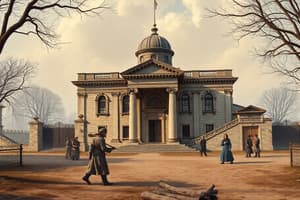Podcast
Questions and Answers
What is the primary focus of cultural history?
What is the primary focus of cultural history?
- Governance and political events
- Cultural practices, art, religion, and literature (correct)
- Economic systems and trade practices
- Military strategies and battles
Which era is characterized by the time before written records?
Which era is characterized by the time before written records?
- Renaissance
- Ancient History
- Middle Ages
- Prehistoric Era (correct)
What type of historical sources are firsthand accounts like letters and photographs classified as?
What type of historical sources are firsthand accounts like letters and photographs classified as?
- Primary Sources (correct)
- Secondary Sources
- Critical Sources
- Tertiary Sources
What historical event is signified by significant changes in political power or government structure?
What historical event is signified by significant changes in political power or government structure?
Which period is known for the cultural revival emphasizing art and science from the 14th to 17th centuries?
Which period is known for the cultural revival emphasizing art and science from the 14th to 17th centuries?
Which of the following best defines historiography?
Which of the following best defines historiography?
How does history help in understanding identity?
How does history help in understanding identity?
Who is often referred to as the 'Father of History'?
Who is often referred to as the 'Father of History'?
Flashcards are hidden until you start studying
Study Notes
Key Concepts in History
-
Definition of History: The study of past events, particularly in human affairs, which helps understand how societies and cultures have evolved.
-
Branches of History:
- Political History: Focuses on governance, political events, and leaders.
- Social History: Examines the lived experiences of people and social structures.
- Economic History: Looks at economic systems, trade, and the evolution of economies.
- Cultural History: Studies cultural practices, art, religion, and literature throughout time.
- Military History: Analyzes wars, battles, and military strategies.
-
Historical Methodology:
- Primary Sources: Original documents, artifacts, or firsthand accounts from the time studied (e.g., letters, photographs).
- Secondary Sources: Interpretations and analyses created after the fact (e.g., textbooks, articles).
- Historiography: The study of how history is written and the different interpretations of historical events.
-
Important Periods in History:
- Prehistoric Era: Time before written records; includes the Stone Age and Bronze Age.
- Ancient History: Covers early civilizations from around 3000 BCE to 500 CE (e.g., Mesopotamia, Ancient Egypt, Greece).
- Middle Ages: Roughly 500 CE to 1500 CE; marked by feudalism and the rise of kingdoms.
- Renaissance: A cultural revival from the 14th to 17th centuries, emphasizing art, science, and humanism.
- Modern History: From the late 15th century to the present, including events like the Industrial Revolution and World Wars.
-
Historical Events and Movements:
- Revolutions: Significant changes in political power or government structure (e.g., American Revolution, French Revolution).
- Colonialism: The establishment of control over foreign lands and peoples, significantly impacting global history.
- Civil Rights Movements: Efforts to end racial discrimination and promote equality (e.g., Civil Rights Movement in the U.S.).
-
Significance of History:
- Understanding Identity: History shapes national and cultural identities.
- Lessons from the Past: Provides insights into human behavior, societal trends, and potential future outcomes.
- Preservation of Memory: Helps preserve the achievements and tragedies of humanity for future generations.
-
Key Historians and Philosophers:
- Herodotus: Often called the "Father of History"; emphasized the importance of inquiry.
- Thucydides: Focused on a more analytical approach to history, particularly in his account of the Peloponnesian War.
- Karl Marx: Introduced historical materialism, linking history to economic factors and class struggles.
General Themes in Historical Study
- Change and Continuity: Examines what changes over time and what remains constant in societies.
- Causation: Investigates the causes and effects of historical events.
- Perspective: Acknowledges the importance of viewpoint, context, and bias in historical interpretation.
- Interconnectedness: Highlights how events in one part of the world can influence others, emphasizing global history.
Definition and Branches of History
- History is the study of past human events, crucial for understanding societal and cultural evolution.
- Political history examines governance, political events, and influential leaders in shaping nations.
- Social history focuses on personal experiences, social structures, and the impact of societal norms on individuals.
- Economic history explores economic systems, trade networks, and the development of economic practices over time.
- Cultural history investigates the evolution of cultural elements such as art, religion, and literature.
- Military history analyzes conflicts, warfare, and strategies that have defined nations and societies.
Historical Methodology
- Primary sources include original documents and artifacts offering firsthand insights into historical contexts (examples: letters, diaries, photographs).
- Secondary sources involve analyses or interpretations created after events occurred, aiding in understanding historical narratives (examples: textbooks, scholarly articles).
- Historiography studies the discipline of history, evaluating varying interpretations and narratives presented by different historians.
Important Periods in History
- The Prehistoric Era predates written records, encompassing significant periods like the Stone Age and Bronze Age.
- Ancient History spans from around 3000 BCE to 500 CE, featuring early cultures like Mesopotamia, Ancient Egypt, and Greece.
- The Middle Ages, between 500 CE and 1500 CE, showcased the feudal system and the emergence of powerful kingdoms.
- The Renaissance, from the 14th to 17th centuries, marked a cultural and intellectual revival focused on art, science, and humanism.
- Modern History, starting in the late 15th century, includes transformative events like the Industrial Revolution and the World Wars.
Historical Events and Movements
- Revolutions signal drastic shifts in political power, such as the American and French Revolutions.
- Colonialism involves establishing control over foreign territories, significantly altering global dynamics and cultures.
- Civil Rights Movements seek to combat racial discrimination and promote equality, exemplified by the Civil Rights Movement in the United States.
Significance of History
- History plays a pivotal role in shaping national and cultural identities, fostering a sense of belonging among communities.
- By analyzing historical events, lessons can be drawn regarding human behavior, societal developments, and predicting future trends.
- Historical preservation ensures that achievements and tragedies are remembered and learned from by future generations.
Key Historians and Philosophers
- Herodotus is considered the "Father of History" for his emphasis on inquiry and narrative in historical writing.
- Thucydides adopted an analytical approach, contributing significant insights, especially regarding the Peloponnesian War.
- Karl Marx introduced historical materialism, associating historical progression with economic factors and class struggles.
General Themes in Historical Study
- Change and Continuity scrutinizes transformations and persistent elements within societies over time.
- Causation investigates the relationships between events and their consequences, illuminating how historical dynamics operate.
- Perspective underscores the necessity of recognizing viewpoint and bias in comprehending historical narratives.
- Interconnectedness emphasizes the global nature of history, illustrating how events can profoundly affect distant regions.
Studying That Suits You
Use AI to generate personalized quizzes and flashcards to suit your learning preferences.




